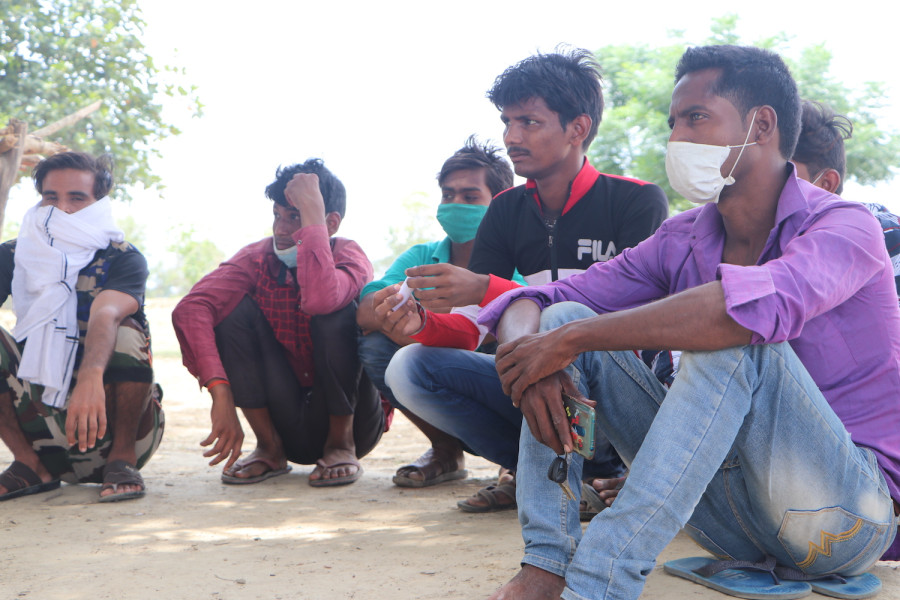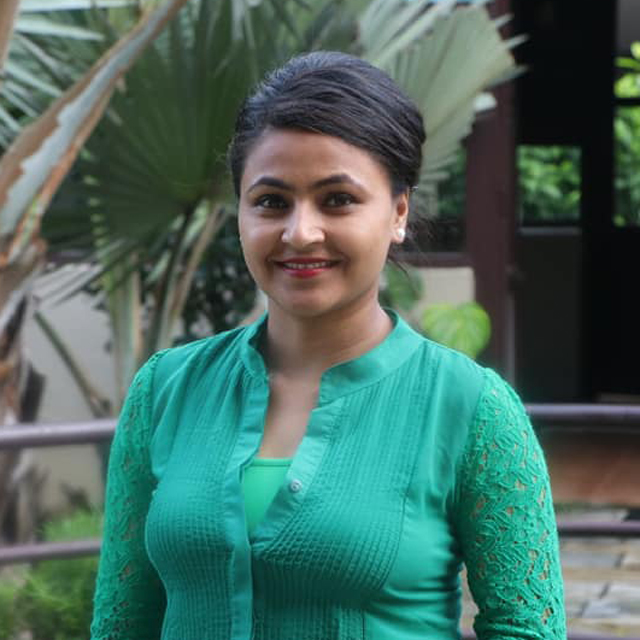Lumbini Province
Discharged Covid-19 infected individuals return to their villages only to be shunned
Returnees to their villages in Narainapur face hunger, poverty and ostracisation in society.
Madhu Shahi & Rupa Gahatraj
Dinesh Dhobi, a daily wage worker in Mumbai, India, lost his job amid the Covid-19 pandemic and had to return home recently. Upon his return to the country, he tested positive for the virus and was placed in an isolation ward in Kohalpur. However, in the two weeks that he spent at the ward, he did not show any symptoms of the disease, so authorities sent him home.
But despite being in his hometown of Mataiya in Narainapur Rural Municipality, Dhobi has yet to enter his house. He sleeps on his house’s rooftop at night and spends the whole day by the Rapti riverside. His family and villagers avoid any contact with him, scared that they might catch the virus.
“I spent two months in Mumbai without any work and had to return home empty-handed. I borrowed Rs 5,000 from a friend and reached the no-man’s land in Narainapur,” said Dhobi. “I don’t have any source of income left. My family is running short of food and are scared that I might spread the virus. So I choose to spend the time by myself and keep my distance from everyone.”
A week ago, the federal government had implemented a directive to send coronavirus infected individuals to their homes if they don’t show any symptoms of the disease after spending two weeks in isolation. Dhobi is among the 22 asymptomatic Covid-19-infected individuals who were sent home from the isolation centres in Kohalpur and Corona Special Hospital in Dang on June 8.
They were advised by the doctors at the hospital and the isolation centre to stay in self-isolation at home for 10 days.
Another returnee from India, Omkar Yadav of the same village, is also struggling to survive with no income and no support from the villagers. He can’t even afford to buy a surgical face mask and uses a piece of cloth to cover his nose and mouth, he says.
“The villagers scolded me for not wearing a mask so I started covering my mouth with a piece of cloth. This is cultivation season and there is plenty of work in the village but the villagers don’t want me working for them,” he said. “My neighbours don’t talk to me anymore; they are scared that I might infect them with the virus.”
The situation is the same for Ramjan Behan, a resident of Mataiya, who returned to his home from an isolation centre in Dang five days ago.
“I have run out of money to buy salt and cooking oil. I have food grains in store which I want to sell or exchange for some salt but none of the villagers wants to trade with us,” he said. “They are afraid of me and my family now. They won’t even employ me in their fields.”
A majority of Mataiya locals go to India to work as daily wage workers and most of them have returned home because of the pandemic and the subsequent lockdown.
“On one hand, the youths who were providing for their families have lost their source of income and are in need of jobs,” said Yubaraj Maurya, the ward chairman in Narainapur Rural Municipality-5. “On the other hand, the entire village is now worried about a possible outbreak of the disease and are afraid to employ the returnees. The authorities decided to send the infected to their villages without thinking of the repercussions it would have on the villagers and the returnees.”
The rural municipality has arranged for mosquito nets, bed sheets, masks and other sanitary materials for the coronavirus-infected people to use at home while in self-isolation.
“But the quantity is not enough. The family members of the infected frequent the ward office either demanding work or relief materials. But the number of returnees is increasing by the day and we don’t have the resources to look after all of them,” said Maurya.
It hasn’t been easy to return home and live with the fear of being excluded from society, said Parameshwar Godiya, a recent returnee to Mataiya.
“I spent several weeks in quarantine facilities and isolation centres after I tested positive for the virus. Now that I have returned to the village, I don’t know how long it will take for the villagers to stop branding me as a coronavirus patient. I wish we had one more test done just to rule out the disease but they sent us home without doing a second test,” Godiya said.
Sarbir Khan of the same village, who returned home after full recovery a few days ago, already feels cut off by the villagers.
“Even my neighbours don’t treat me the same as before,” he said. “I have nothing left to eat at home but no one has come forward to help us in these difficult times. There’s no employment or support.”
Chairman of the rural municipality Istiyak Ahamad Shah says the local unit does not have the funds to provide any relief to the returnees. So far, 118 people have been infected with coronavirus in Narainapur. Among them, one died and others were discharged from isolation centres and sent home.
The situation is similar in Yashodhara Rural Municipality of Kapilvastu. Seven Covid-19-infected individuals, who recently returned to their villages, also talk about being ostracised by the villagers.
“My neighbours don’t talk to me; they turn away if they see me coming,” he said. “I feel so unwelcome in my own village,” said a 28-year-old Covid-19-infected man in Banskhor.
In some cases, despite having fully recovered from the virus, some returnees say they continue to get shunned by villagers and relatives.
“I contracted Covid-19 while I was in Mumbai and now I have recovered. But my relatives and neighbours still don’t want to engage with me,” said a 46-year-old man from the same rural municipality.
Girajesh Pandey, chairman at Yashodhara Rural Municipality, admits that infected returnees are facing discrimination at the hands of their own villagers and within their community. “We are trying to raise awareness about the disease but it will take some time for the villagers to accept the new reality,” Pandey said.
Manoj Paudel in Kapilvastu contributed reporting.




 14.12°C Kathmandu
14.12°C Kathmandu














